
views
Applying for a Position

Explore your potential NSA career options. Think over your skills and interests, and how they might fit in with the work being carried out by the agency. The NSA employs professionals of all kinds, including tech experts, mathematicians, engineers, linguists, and police and military personnel. No matter what your area of expertise may be, your foremost commitment should be the defense of national security. If you're not sure where you might fit, use the Job Exploration tool on the NSA website to find out how your aptitudes can best be applied.
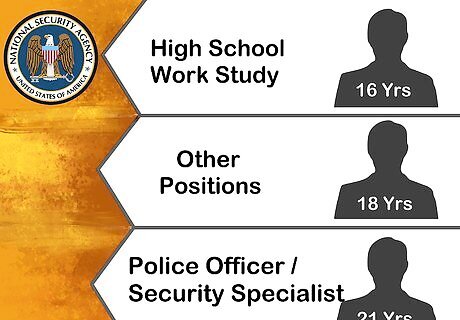
Meet the minimum age requirement for your chosen field. If you’re interested in joining the NSA’s High School Work Study program, you’re free to apply as young as 16 years old. Most other positions will require you to be at least 18. Those who are seeking to become an NSA police officer or security specialist must be 21 or older. There’s no need to hold off on starting an application if you’ll be turning the minimum required age for the position during the selection process.
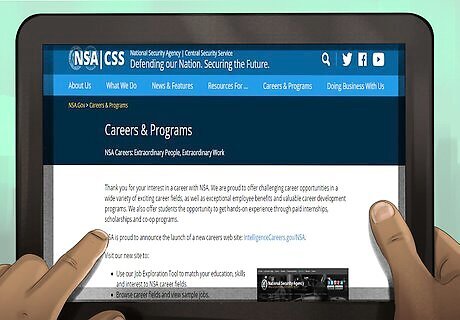
Apply for an open position. Log onto the “Careers” section of the NSA website to browse various openings. When you see one you think you might be suited for, click the link to find out more about the position and fill out an application. The application itself may take anywhere from 30 minutes to an hour to finish. Make sure the information you provide is complete and accurate to the best of your ability. If it’s not, the agency has ways of finding out. You may also be asked to upload digital copies of important identifying documents, such as your driver’s license, military ID, or educational transcripts.
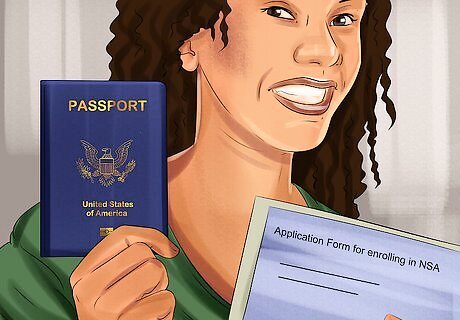
Present proof of citizenship with your application. In order to work for America’s most far-reaching intelligence organization, you must have either been born in the United States or become a naturalized citizen. This information can be obtained from your birth certificate or a valid passport. Holding dual-citizenship doesn’t disqualify you from being hired, though you may be subjected to additional screening. Because the NSA's underlying mission is the protection of the nation and its citizens, it’s possible that an applicant might be rejected on the basis of their cultural background. Agency officials reserve the right to pass over candidates that come from countries that aren't considered allies of the United States.

Wait 1-5 weeks for a response. Following a thorough review period, you will be contacted by a representative from Human Resources to discuss your application in greater detail. They will go over the agency's exact qualification standards with you and inform you of any issues with the materials you provided. Afterwards, you'll be told what steps you should take next. Be patient. It may take as long as 2 months to hear back about your application.

Contact NSA representatives for assistance. If you have any questions or concerns about the hiring process in the meantime, get in touch with the agency's customer service department directly by dialing 1-866-NSA-HIRE (1-866-672-4473). You can also send an email to [email protected], or fill out the inquiry form provided on the NSA website. A representative will typically reply to your message within 2-3 business days. If the information you need is time-sensitive, it's better to pick up the phone. You'll get a faster response than you would by going through email. Before you call or email, read through the NSA's Frequently Asked Questions page. The answer you're looking for may be found there.
Making it Through Basic Screening

Submit to an extensive background check. If your application is selected for review, you’ll be mailed a series of questionnaires requesting details about you and your personal history. In addition to your basic personal information, these forms may also ask you about your religious and political affiliations and general lifestyle. Again, it’s important that your answers be as accurate and comprehensive as possible. As part of your background check, NSA investigators may get in touch with the people close to you, including your family, friends, neighbors, and current and former employers. Because of the need to thoroughly vet candidates, the NSA’s security forms can seem somewhat invasive. Read over the questions on each form to make sure you’re comfortable with what you’re disclosing before sending them off.

Complete an initial phone interview. Next, you’ll be contacted to speak directly to a representative of the department you’re applying to work for. A phone conversation is typically the first of many in-depth interviews. The main purpose of this dialogue is to review and confirm the information you’ve supplied up to this point, after which you’ll be given instructions for how to proceed. Phone interviews may be scheduled in advance or conducted unannounced. Use a courteous, professional tone of voice and be ready to think on your feet.
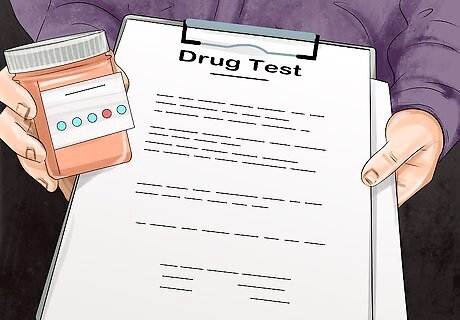
Pass one or more random drug screenings. Drug use is strictly prohibited by the NSA. To enforce this policy, hiring coordinators warn new applicants that drug tests may be administered at any time without prior notice. These tests will continue even after you’ve been hired. If you’ve recently partaken of any recreational substances, give them plenty of time to work their way out of your system before submitting your application.

Sit for a polygraph exam. Hiring for more sensitive positions sometimes requires the use of a lie-detector. Your interviewer will hook you up to the machine and prime you with a series of questions designed to test your responsiveness under pressure. Keep your responses truthful and be prepared to explain any unusual readings that the machine happens to pick up. Do your best to stay calm. The subject’s heart rate and other involuntary factors are often used to interpret the results of the test, which means a nervous answer could be mistaken for a lie. NSA employees should expect additional exams in the future following a promotion, performance assessment, or high-priority assignment.

Take and pass any other tests as specified. From here, the interview requirements will become more individually tailored to the position you’re applying for. You might be directed to translate a complex document if you’re an expert in languages, or given logical problems to solve to demonstrate your aptitude for problem solving. This is where you’ll have a chance to show off your unique skillset and make an impression on your interviewer. Applicants who are attempting to become a member of the NSA’s police or security team will have to undergo an intensive physical preparedness test.
Finalizing the Hiring Process

Go through a series of specialized interviews with NSA officials. With the basic set of tests out of the way, the hiring directors will begin narrowing down their list of potential candidates. The interviews will become considerably more difficult at this stage. As with earlier sessions, do your best to be forthcoming and express yourself professionally. There’s no way to know the exact number of interviews an applicant will need to pass—in many cases, it may simply depend on the position. The NSA's website points out that it can take anywhere from 7-12 weeks to proceed from one phase of testing to the next. At the end of each cycle, you’ll be contacted about whether or not you successfully made it to through to the next round of interviews.

Give a talk on your area of expertise if asked. Certain departments may ask prospects to give a detailed presentation on an advanced topic of their choosing. This presentation should relate in some way to your position within the agency or the work taking place there. It may be necessary to defend the ideas you lay out before a panel of officials, who will want to see if they hold up to scrutiny. A mathematician hired to the NSA’s cyber crimes division, for example, might choose to explain the significance of mathematical principles in developing algorithms used to stop data theft.
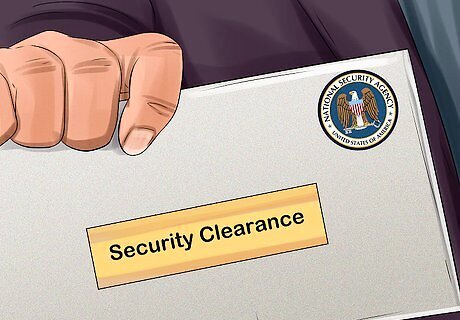
Receive your security clearance. Investigators will take into account the information you provided during the application and interview phases to determine whether you’re a qualified and trustworthy candidate. This is the final hurdle to clear. Once you’ve been granted clearance, you’ll be officially welcomed into the ranks of the NSA. The level of clearance you receive will be based on the responsibilities of your position. Technicians and public affairs officers may be issued standard badges, while elite crypto-analysts and counter-terrorism experts will be given top-secret clearance due to the highly sensitive nature of their work. Common grounds for denial of clearance include questionable foreign allegiances, drug abuse, debt, and emotional or psychological issues.



















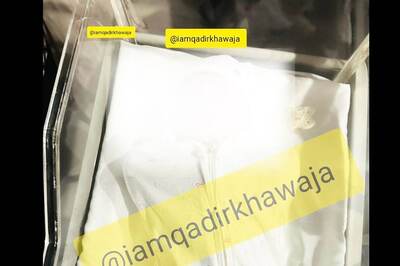
Comments
0 comment